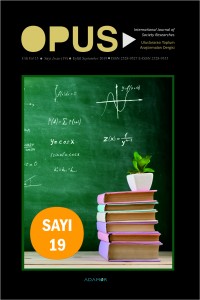Kant’s Criticism of The Claims Concerning The Immortality of Soul and Plato’s Probable Answers in Phaidon
Abstract
It can be said that Kant, in comparison to his
predecessors, has caused a more significant change in the course of
philosophical enterprise. It is possible to say that Kant achieves such an
impact by explaining human experience and providing foundations for natural
sciences after denying the existence of soul as substance as classical
metaphysics defends. According to him, there is no need to defend the existence
of intelligible in themselves to constitute empirical experience. However,
according to Plato, in order to explain the sensory world, it is necessary to
move from the existence of intelligible. For this reason, Plato tries portray
intelligible as evidence for the existence and immortality of the soul. Plato
suggests a number of arguments in his Phaidon to defend the immortality of the
soul. How can we evaluate Plato’s arguments in Phaidon in view of Kant’s view
of the constitution of the empirical objects? Can it be claimed that Kebes’
objections against accepting soul as a substance anticipate those of Kant’s
concerning the immortality of the soul? In this study, Plato’s answers to Kebes
are discussed by keeping Kant’s criticisms in mind.
References
- Borad, C. D. (1978). Kant an introduction. London: Cambridge University Press.
- Brook, A. (1994). Kant and mind. New York: Cambridge University Press.
- Çitil, A. A. (2012). Matematik ve metafizik. İstanbul: Alfa Yayınları.
- Dickerson, A. B. (2004). Kant on representation and objectivity. New York: Cambridge University Press.
- Friedman, M. (1992). Kant and the exact sciences. London: Harward University Press.
- Guyer, P. (1987). Kant and claims of knowledge. New York: Cambridge University Press.
- Keller, P. (2004). Kant and the demands of self-counsciousnes. New York: Cambridge University Press.
- Hanna, R. (2001). Kant and foundations of analytic philosophy. New York: Oxford University Press.
- Longuenesse, B. (2000). Kant and capacity to judge, (çev., C. T. Wolfe) New Jersey: Princeton University Press.
- Melnick , A. (2009). Kant’s theory of self. New York: Routledge Press.
- Kant, I. (1993). Arı usun eleştirisi. (çev. A. Yardımlı), İstanbul: İdea yay.
- Platon (2015). Phaidon (çev. F. Akderin). İstanbul: Say yay.
- Temizkan, V. (2016). Platon’un Phaidon diyalogunda Anamnesis Kuramı. Felsefe ve Sosyal Bilimler Dergisi, 21, 217-230.
Kant’ın Ruhun Ölümsüzlüğüne İlişkin Görüşlere Yönelik Eleştirileri ve Phaidon Diyaloğundan Hareketle Platon’un Bu Eleştirelere Verebileceği Olası Cevaplar
Abstract
Kant’ın, kendisinden
sonraki düşüncede eskisine nazaran önemli bir değişimi gerçekleştirdiği
söylenebilir. Bu değişimin kaynağında Kant’ın, klasik metafiziğin ruhun varlığının
ortaya konulabileceği ve ruh üzerinden insani tecrübenin açıklanabileceği
yaklaşımını eleştirmesi, ruhun bir töz olarak varlığı iddia edilmeden de insan
tecrübesinin açıklanabileceği ve bilimlerin temellendirilebileceğini
savunmasının var olduğunu söylemek mümkündür. Ona göre duyusal tecrübenin
kuruluşundan bahsedilebilmesi için düşünülürlerin (Noeta) varlığını savunmaya
gerek yoktur. Oysa Platon’a göre duyusal dünyanın açıklanması için
düşünülürlerin varlığından hareket edilmesi gerekir. Bu nedenle de Platon,
düşünürleri var kabul ederek ruhun varlığına ve ölümsüzlüğüne de delil olarak
göstermeye çalışır.Platon ruhun ölümsüzlüğünü savunmak için Phaidon adlı
eserinde birçok kanıt ileri sürmektedir. Kant’ın ampirik nesnenin kuruluşuna
dair yaklaşımı dikkate alındığında Phaidon’da ruhun ölümsüzlüğü ilgili var olan
kanıtlar ne şekilde ele alınabilir? Ya da Phaidon adlı eserde ortaya konulan
delilleri Kant’ın eleştirilerine bir cevap olarak görmek mümkün müdür?
Phaidon’daki Kebes adlı şahsın ruhun ölümsüzlüğüne yönelik itirazlarının
Kant’ın ruhu bir töz olarak kabul etmeye yönelik eleştirilerini anımsattığı
söylenebilir mi? Bu çalışmada Platon’un Kebes’e cevapları Kant’ın eleştirileri
dikkate alınarak tartışılmaktadır
References
- Borad, C. D. (1978). Kant an introduction. London: Cambridge University Press.
- Brook, A. (1994). Kant and mind. New York: Cambridge University Press.
- Çitil, A. A. (2012). Matematik ve metafizik. İstanbul: Alfa Yayınları.
- Dickerson, A. B. (2004). Kant on representation and objectivity. New York: Cambridge University Press.
- Friedman, M. (1992). Kant and the exact sciences. London: Harward University Press.
- Guyer, P. (1987). Kant and claims of knowledge. New York: Cambridge University Press.
- Keller, P. (2004). Kant and the demands of self-counsciousnes. New York: Cambridge University Press.
- Hanna, R. (2001). Kant and foundations of analytic philosophy. New York: Oxford University Press.
- Longuenesse, B. (2000). Kant and capacity to judge, (çev., C. T. Wolfe) New Jersey: Princeton University Press.
- Melnick , A. (2009). Kant’s theory of self. New York: Routledge Press.
- Kant, I. (1993). Arı usun eleştirisi. (çev. A. Yardımlı), İstanbul: İdea yay.
- Platon (2015). Phaidon (çev. F. Akderin). İstanbul: Say yay.
- Temizkan, V. (2016). Platon’un Phaidon diyalogunda Anamnesis Kuramı. Felsefe ve Sosyal Bilimler Dergisi, 21, 217-230.
Details
| Primary Language | Turkish |
|---|---|
| Journal Section | Articles |
| Authors | |
| Publication Date | September 30, 2019 |
| Acceptance Date | September 12, 2019 |
| Published in Issue | Year 2019 Volume: 13 Issue: 19 |


